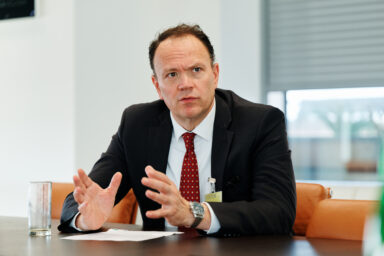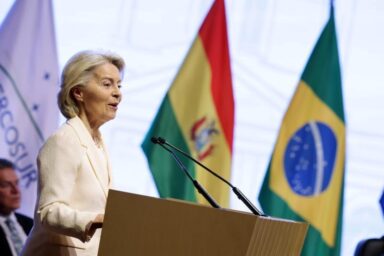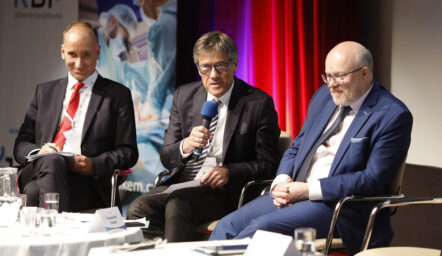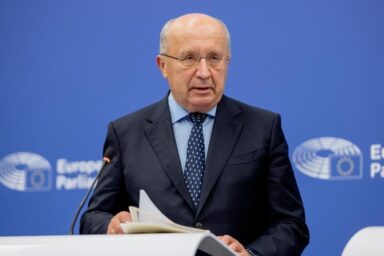The second trilogue on the EU pharmaceutical package brought little political progress this week. Negotiators deferred key elements of the reform for further technical work. Among them was patient representation at the European Medicines Agency (EMA). This chapter will return to the table at the next round in November.
A source close to the talks told EU Perspectives that the 7 October meeting in Strasbourg mainly confirmed chapters already agreed at expert level. Negotiators postponed discussions on several unresolved provisions under both the Directive and the Regulation.
These include the pharmacy exemption, contraceptive derogation, scope of the environmental-risk assessment, antimicrobial access plan, and the prescription status and awareness card for antimicrobials. Under the Regulation, open points remain on EMA governance and the duration of marketing-authorisation reviews.
“For all of these points, it was decided that further work was needed at the technical level,” the source confirmed. Experts will now refine the text before the next trilogue, scheduled for 10–11 November.
You might be interested
Patient involvment: no movement yet
Among the topics left open, patient involvement and voting rights at the EMA remain one of the most politically sensitive. The issue is central to how the EU modernises medicines regulation while keeping decisions transparent and patient-centred.
The European Patients’ Forum (EPF) confirmed that negotiators made no progress on this issue during the trilogue.
“The issue of patient representation and voting rights at the EMA was not resolved during this latest round of negotiations,” an EPF spokesperson told EU Perspectives. “The Danish Presidency was bound by its existing mandate, which could not be updated last week. As a result, it was not in a position to introduce new elements or compromises on this point. Including on patient involvement and voting rights.”
EPF added that it welcomed the Parliament’s firm stance on maintaining voting rights for patient and healthcare representatives in EMA committees. A position supported by evidence of the added value of patient participation.
“We appreciate that, for the European Parliament, patient involvement and voting rights remain a firm red line,” the organisation said. “The Parliament continues to recognise the clear added value of patient participation in EMA committees. This is a view supported by the direct experience of our members who contribute to these committees, as well as by research.”
No bargaining tool
Both EPF and EURORDIS–Rare Diseases Europe expressed concern that if the Council’s negotiating mandate remains unchanged, patient representation risks becoming a bargaining tool in the next stages of negotiation.
If the mandate of the Danish Presidency remains unchanged, we sincerely hope that patient representation will not be used as a bargaining tool in negotiations with the Parliament and the Commission. — European Patients’ Forum
“If the mandate of the Danish Presidency remains unchanged, we sincerely hope that patient representation will not be used as a bargaining tool in negotiations with the Parliament and the Commission,” they said. “Such an approach would be counterproductive and risky, undermining the spirit of patient-centred policymaking that the reform aims to achieve.”
Negotiators will need to revisit these governance provisions in the November trilogue. Alongside other politically sensitive topics such as regulatory data protection, transferable exclusivity vouchers, and supply-security obligations.
Patient organisations maintain pressure
As trilogue discussions shift toward more technical and access-related issues, EPF said it will continue to highlight the practical value of patient engagement across all phases of the medicines life cycle.
“As trilogue discussions move into more technical and access-related areas, EPF will continue to consistently emphasise the importance and tangible value of meaningful patient involvement,” the organisation said. “This is essential to ensure that innovation throughout the entire life cycle of medicines genuinely responds to patients’ needs.”
In an era of rapid medical and digital innovation, it is crucial that patients are not only beneficiaries but also co-creators of innovation — European Patients’ Forum
EPF and EURORDIS plan to advance this dialogue further during the EPF Congress on 26–27 November, coinciding with the later trilogue stages. The conference will explore how to embed patient involvement across the life-sciences ecosystem. From clinical trials and regulatory evaluation to health-technology assessment and the use of patient-experience data.
“In an era of rapid medical and digital innovation, it is crucial that patients are not only beneficiaries but also co-creators of innovation,” EPF said, adding that its upcoming conference would “focus on how to embed patient involvement across the life-sciences ecosystem.”
Next round in mid-November
Negotiators will return in mid-November to tackle the core political questions left unresolved since June. Their ability to bridge the Council’s cautious approach with the Parliament’s push for stronger participation and access will decide whether a deal is possible before the end of the Danish Presidency.
If consensus proves elusive, the file could roll over into 2026. This would extend uncertainty around one of the EU’s most consequential health-policy reforms in decades.










